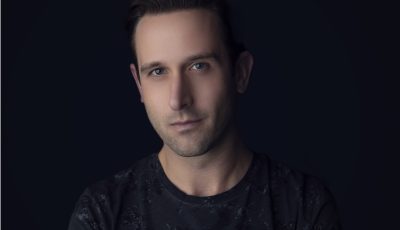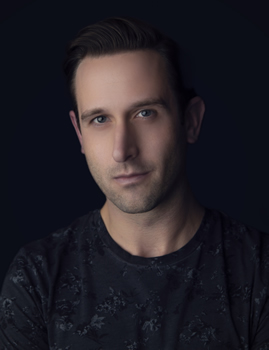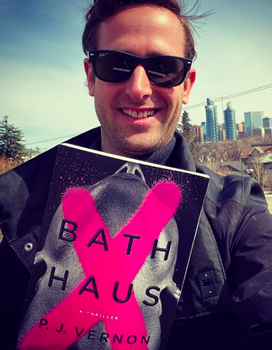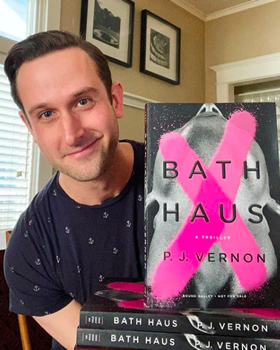

On the Cover: P.J. Vernon
Writing First, Getting into Trouble Later
In the opening pages of P. J. Vernon’s BATH HAUS, the reader has no doubt that Oliver Park is about to make a terrible decision. Oliver, whose marriage to a prominent trauma surgeon provides most of what he needs but too little of what he wants, has ventured to Haus, a gay bathhouse in Washington, DC. It’s a place designed for anonymous sex, and that’s exactly what Oliver, who has toed the line of infidelity but never crossed it, is looking for.
What he finds, though, is a nightmare that will dismantle his life, piece by piece. Oliver narrowly escapes a terrifying encounter with a man named Kristian, who looks like Alexander Skarsgård but might be a serial killer. The attack leaves Oliver with a hand-shaped bruise on his throat, and that’s where his troubles begin in earnest. (In BATH HAUS, being nearly strangled to death by a naked, turned-on psychopath is not the worst thing that can happen.) Oliver, it turns out, is a recovering drug addict who credits his husband, Nathan, with saving his life. To Oliver, the dissolution of his marriage would be a death sentence; he fears he’ll relapse without Nathan’s love and guidance. So to explain the bruises to Nathan and cover his tracks, Oliver invents a story about a mugging. From this point on, every decision he makes will only draw the noose tighter around his neck.
BATH HAUS is the second novel from Vernon, a South Carolina native who now lives in Calgary, Alberta, with his husband and their two dogs. It’s the follow-up to his auspicious 2018 debut When You Find Me, a moody and sometimes-grisly Southern Gothic stunner that drew comparisons to S. J. Watson and Gillian Flynn. Expect those comparisons to continue; equal parts psychological thriller and domestic suspense, BATH HAUS is a sleek, ingeniously plotted thriller so shot through with menace and bad intentions that you almost don’t want to leave it in your house unattended. If Flynn and Patricia Highsmith collaborated on a novel while listening to every album Scissor Sisters ever recorded, the result might be something like this.
But let’s be clear: BATH HAUS is not a book aimed at queer readers any more than Gone Girl is aimed at women who have recently staged their own murders. It’s a novel for anyone who likes their thrillers fast-paced, twisty, and a little transgressive, with a protagonist you alternately want to hug and shake. It’s surely one of the books that will define 2021 for thriller fans, and it deserves the widest readership possible.
In his first interview with The Big Thrill, Vernon talks candidly about writing complicated queer characters, breaking down barriers in publishing, and the personal experiences that inspired his “Grindr thriller.”
You’ve said that you originally wanted to center your debut, When You Find Me, on a same-sex couple, but in the end, you went in a different direction. What changed between that book and BATH HAUS?
The fearlessness only relentless rejection can cultivate. While When You Find Me was striking out with literary agents, I had a “fuck it” moment. Why be afraid of writing queer-centered thrillers when I couldn’t sell the book I’d preemptively written them out of? Thankfully, When You Find Me did find a home, but during that process, I decided to be done letting anxiety about what may or may not sell dictate my stories. Changing ourselves and our stories to accommodate folks around us is practically queer muscle memory. It’s exhausting, and I was over it.
Can you trace the inspiration for BATH HAUS to any particular source?
I’m wondering if “fear” is the answer to every question. Honestly, I couldn’t stop thinking about personal vulnerability. Every time I’d log onto Grindr or travel to some stranger’s apartment or wander into some risky-feeling space—2013 was a hell of a year—looking to get laid, I’d always ask myself (joking, but not): “Am I about to get myself killed? Oh well, guess we’ll find out!”
Obviously, that fear never caused me to turn around, and this interior conflict fascinates me to no end. Two very primal needs—the appetite for sex and the drive for self-preservation—being in direct opposition to one another. This is really where BATH HAUS started and where (I think) the story thrives.
In some ways, I feel like #OwnVoices thriller authors have a difficult path to navigate. For instance, I worry about reinforcing negative stereotypes if I write a queer character who behaves badly, but let’s be honest—those are the most interesting characters to write (and read). I still remember loving the idea of Catherine Tramell (the manipulative, bisexual murderess played by Sharon Stone) when Basic Instinct came out, then thinking there must be something wrong with me when I heard about the LGBTQ community’s negative reaction. What are your thoughts on writing queer villains and thorny queer protagonists?
My Catherine Tramell was Andrew Van de Kamp (Desperate Housewives). There was something thrilling and liberating about Andrew’s monstrous behavior. How could I feel “messy” when the gay on TV was sleeping with his mother’s sex-addicted boyfriend for revenge? I loved him for all the reasons I loved Cruel Intentions’ Kathryn Merteuil. They’re both entertaining as hell. I think humans evolved the ability to tell and enjoy stories for cautionary reasons as much as anything else. Queerness is a significant part of us—but we’re not defined by it. Why should we be excluded from any roles—be they good, gray, or downright nasty?
Put another way, I don’t want to sit at the diversity table; I want to sit at the thriller table. Just with books that include queer characters because that’s my lived experience. That’s the uniquely powerful place all authors draw creativity from. Publishing is barriered enough without me restricting my own work, too. But yes, I admit to thinking (a lot) about conversations BATH HAUS might gin up. Promiscuous gays. Vulnerable spaces like bathhouses being used by unscrupulous others. Grindr as a plot vehicle for terror. But why is “promiscuity” so transgressive in the first place? Relationships come in an endless array of configurations, so why conform to normative ideals of what is or is not “edgy?” Marriage was kept from us for so long, so are we really beholden to those who withheld it? The right to answer these questions for ourselves as individuals is something worth fighting for. Even, and especially, in fiction.

Vernon signs a copy of his debut When You Find Me at the book’s official launch event in November 2018.
Oliver’s queerness is not incidental to the story; it informs nearly every choice he makes and every plot point, from his interactions with the police to his instinctive secretiveness. At the same time, many of his insecurities and struggles are universal. When you were writing BATH HAUS, did you give any thought to whether he’d be relatable to cis-het readers?
Queers and our complicated relationship with secretiveness and truth, am I right? As far as broader readership goes, relatability wasn’t top of mind—but not because I didn’t care. Yes, Oliver is a cis-gay man, but Oliver is also a human being. He accesses the same repertoire of emotions and feelings as any reader. They may not directly relate to wandering the jungle-hot hallways of a bathhouse, but they know what it’s like to be scared. Or feel different. Or betrayed. Like Oliver, readers make mistakes and have regrets. They behave sympathetically at times and unsympathetically at others. They are jealous. They are lustful. They feel love and shame and pain.
Accessibility, on the other hand, was a concern from page one. Striking a balance between bringing non-queer readers into the narrative, sharing the language and the culture and the eccentricities through world-building—and not boring queer folks with details they live every day—was a high priority. I hope I’ve succeeded, because my book needs broad buy-in if it’s going to do well. That’s just math, but the early “mainstream” reception has been tremendously encouraging.
You’ve said that talent is learnable—please tell me how you learned to write like you do so I can learn it too.
I appreciate this praise so much—thank you! Writing is totally subjective, but everyone begins somewhere. I don’t enjoy taking myself seriously. I don’t live in New York. I have no MFA or formal creative training. If anything, my career was a barrier to finding a narrative voice. I was an immunologist who published gripping titles like Rapid Detection of Neutrophil Oxidative Burst Capacity Is Predictive of Whole Blood Cytokine Responses. It’s a real white-knuckler. One of my very first fiction critiques? “It sounds like someone with a PhD wrote this.” Dramatic beat. “And not in a good way.” When that’s where you’re starting, the only way to go is up. The willingness to improve—the tenacity—is what talent means to me.
Talent and tenacity are almost synonymous. Am I talented? Well, I don’t possess an innate well of unknowable creativity from which I endlessly draw. Am I tenacious? Hell yes I am. Tenacious enough to ruin manuscript after manuscript until I write one that works. Tenacious enough to open hundreds of rejections, recognizing they have zero impact on that singular, coveted yes. And most importantly: tenacious enough to listen to writers with different perspectives and experiences than myself. The best words are the ones other writers inspire.
The plot of BATH HAUS is like a sadistic Rube Goldberg device, where literally everything Oliver does to try to save himself just tightens the vise he’s caught in. How much did you plan or outline, and how much was off-the-cuff?
If BATH HAUS is lucky enough to get a reprint, can we please, please print “sadistic Rube Goldberg device” on the cover? Love it!
I write first and get into trouble later. If I’m focused on the mechanics of plot, following my heart becomes challenging. And writing fiction is too damn hard if my heart’s not in it. That said, I typically have way points I shoot for. Sometimes these are formed long before a draft. Sometimes they’re decided day-of. Often, they exist for no reason beyond “this book could use a bullet train scene, why not?” The closer I can align my story experience to that of a reader, the better the book will turn out—and I love surprising myself along the way.
I also have a few tricks that help. “How can I make this worse?” is a reliable way to move a story forward when I’m unsure where it goes next. When it comes to twists or reveals, my brain is always searching for a “third way”—meaning the first two ideas for whodunnit or whydunnit or howdunnit are usually discarded or used as red herrings. I also like to work out my character’s moral questions and personal mores beforehand, so they’re driving the story. John Truby’s The Anatomy of Story has a great chapter on this called “Moral Argument.” If Oliver knows what Oliver wants or will do in any given situation, then all I need to do is transcribe.
BATH HAUS is getting an extremely enthusiastic reception so far from critics, fellow authors, and early readers. At what point did you realize you had something special on your hands?
Years before BATH HAUS was acquired, my agent didn’t receive the enthusiastic response we were both looking for. However, during my first Bouchercon panel ever, I shared that I was working on a “Grindr thriller.” There was a palpable reaction in the room. Folks seemed to hold their breath for a moment. The audience felt genuinely engaged by the idea in a way I’d never experienced. So in retrospect, I think that is the moment I decided to fight like hell for BATH HAUS to happen.
There’s no shortage of queer thrillers in the YA category, but there are fewer options in the adult market. Do you think that’s changing?
I do. And I think all those phenomenal queer voices in YA are helping steer publishers toward opening adult crime fiction. Plenty of adults dig YA (I recently fell in love with She’s Too Pretty to Burn, Wendy Heard’s creepy, modern Dorian Gray re-imagining) but the fact is, readers who are young adults become adults. Some of them will want something new to read, and in my narrow experience, younger folks seem to navigate the world in a refreshingly fluid manner. Labels and binaries and boxes don’t seem to matter much. Certainly not in books.
I’m also uncertain readership bears responsibility for the absence of these voices in adult genre fiction. Thriller readers just crave a great thriller. The industry determines which books wind up on retailer shelves. Naturally, this presents opportunities for gatekeepers to speak on behalf of readers whose tastes they may not fully appreciate or understand. My prediction: with recent and forthcoming stunners like Nekesa Afia’s Dead, Dead Girls, John Fram’s The Bright Lands, Micah Nemerever’s These Violent Delights, and many more, the business case for queer crime fiction is only getting stronger.
What can you tell me about your next book?
Not too much (yet). It’s a thriller of course, but it’s a bit of a departure from BATH HAUS—which I hope readers will appreciate. It’s dark and voyeuristic and I’m having a ton of fun. The chance to push my own boundaries or range is an incredible privilege. I just hope I’ll have done it well!
- Between the Lines: Rita Mae Brown - March 31, 2023
- Between the Lines: Stephen Graham Jones - January 31, 2023
- Between the Lines: Grady Hendrix - December 30, 2022




